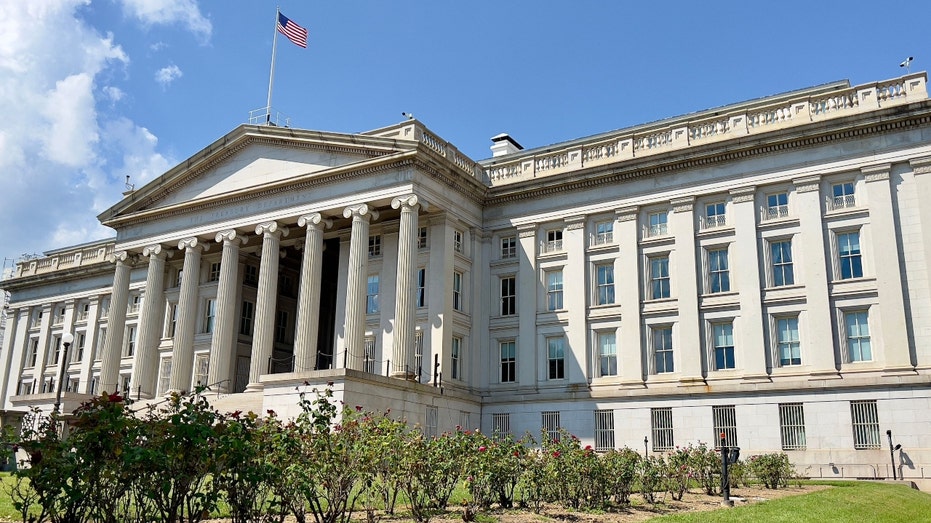GOP lawmakers propose balanced budget amendment as US nears debt ceiling
US will hit its statutory debt limit of roughly $31.4 trillion this week
Holding debt limit hostage won’t fix spending problems: Douglas Holtz-Eakin
Former Congressional Budget Office Director Douglas Holtz-Eakin dissects the battle raging over the debt limit that the U.S. is expected to reach Thursday.
Republicans in Congress are gearing up for the coming clash over raising the debt limit and implementing spending caps with some calling for a balanced budget amendment to the U.S. Constitution.
The proposals come as the U.S. is poised to reach its statutory debt limit of $31.38 trillion on Thursday, which will prompt Treasury Secretary Janet Yellen to begin using "extraordinary measures" involving cash on hand to stave off default.
That will give lawmakers until at least early June to raise or suspend the debt limit, setting the stage for a contentious debate that may see balanced budget amendment proposals get a vote, particularly in the GOP-controlled House.
"When I introduced this constitutional amendment last Congress, I noted that if we didn’t immediately work to put our fiscal house in order, the result would be skyrocketing inflation, higher interest rates and slower economic growth," Rep. Jay Obernolte, R-Calif., said in a statement announcing the introduction of the Obernolte Balanced Budget Amendment.
US DEBT CEILING WILL REQUIRE TREASURY TO TAKE ‘EXTRAORDINARY MEASURES’ TO AVOID DEFAULT

Republicans are proposing balanced budget amendments to the Constitution as the U.S. nears its debt ceiling. ( istock / iStock)
"We are now experiencing all three, thanks in large part to a continuing series of large spending packages and a lack of fiscal responsibility on the part of both the executive and legislative branches of federal government," Obernolte continued. "We must act now to remove wasteful federal spending, get our federal deficit under control and restabilize our economy."
Under Obernolte's proposal, the federal government would be required to balance the budget in the fifth fiscal year after the constitutional amendment is ratified by the requisite 38 states. It would task Congress with enforcing the requirement, and spending could only exceed tax revenue in a given year if two-thirds majorities in the House and Senate vote to allow a specific amount of excess spending.
BUDGET CAP BATTLE BREWING BETWEEN GOP, DEMS AS DEBT LIMIT LOOMS
Reps. Brian Fitzpatrick, R-Pa.; Zachary Nunn, R-Iowa; Derrick Van Orden, R-Wis.; and Scott Perry, R-Pa., have also introduced balanced budget proposals of their own in the first few weeks of the 118th Congress. Each allows Congress to waive the requirement with either three-fifths or two-thirds votes of both chambers to account for war, disasters and other national emergencies, although there are some differences:
- Perry's and Van Orden's amendments would require the budget to be balanced 10 years after ratification, rather than five years as required under Fitzpatrick's, Obernolte's and Nunn's.
- Perry's would require a three-fifths vote of both chambers of Congress to raise the debt limit, increase tax revenue or exceed a spending cap that would begin at 20% of gross domestic product (GDP) in the first year after ratification and gradually decline to a minimum of 16%.
JAMIE DIMON SOUNDS ALARM ON RISING DEBT HAVING ‘POTENTIALLY DISASTROUS OUTCOMES’

The U.S. federal deficit totaled $2.8 trillion during the 2021 fiscal year, marking the second-highest budgetary shortfall on record. (istock / iStock)
Critics of balanced budget amendment proposals have argued that a requirement to balance spending levels with revenues could lead to harmful results when recessions occur. Downturns typically cause spending on safety net programs like unemployment insurance to rise, and policymakers often warn against raising taxes in a recession because it would further dampen economic activity. But a balanced budget amendment could force the federal government to take those steps to avoid running a deficit.
Others have expressed concern about the impact of a balanced budget amendment on programs like Medicare and Social Security if they aren't exempted from its requirements, a move that could result in continued deficit spending given that they're two of the most expensive items in the federal budget. Both entitlement programs enjoy broad political support, and their cost is expected to continue to rise in future years as America's population ages.
US NATIONAL DEBT ON PACE TO BE 225% OF GDP BY 2050, PENN WHARTON SAYS
According to an analysis by the nonpartisan Committee for a Responsible Federal Budget (CRFB), balancing the budget over the course of a decade would require a 26% cut to all federal spending. Further, the CRFB found that figure would rise to about 85% if lawmakers chose to avoid politically challenging cuts to spending on defense, veterans, Medicare and Social Security.
The CRFB notes that a desire to balance the federal budget is an "admirable and desirable goal" but that it's likely an infeasible one to achieve within 10 years. Instead, the CRFB suggests lawmakers pick a different target like balancing the primary (non-interest) budget, reducing or stabilizing the debt as a share of GDP, setting a 10-year savings target like $7 trillion in deficit reduction or $4 trillion of non-interest spending cuts or providing a timeline longer than 10 years for the budget to be brought into balance.

The Department of the Treasury building in Washington, D.C. (Daniel Slim/AFP via Getty Images / Getty Images)
Every state but Vermont has a requirement to balance its budget, according to the National Association of State Budget Officers. While such policies keep the states from racking up substantial amounts of debt, they also force state policymakers to make difficult budgetary decisions to align spending with tax receipts when the economy is slow. Those challenges would be amplified at the federal level, where balanced budget proposals have historically struggled to find success in Congress.
While Congress has voted on balanced budget amendments on numerous occasions dating to 1982, when a balanced budget proposal advanced out of the Senate, it has never successfully advanced such a proposal to the states for constitutional ratification, at which point 38 states would have to vote for the amendment's adoption.
GET FOX BUSINESS ON THE GO BY CLICKING HERE
The closest Congress has come was in 1995, when a balanced budget amendment passed the House with the requisite two-thirds majority but fell one vote shy of that margin in the Senate. No balanced budget amendment proposal has passed either chamber since then, according to the Congressional Research Service.




















